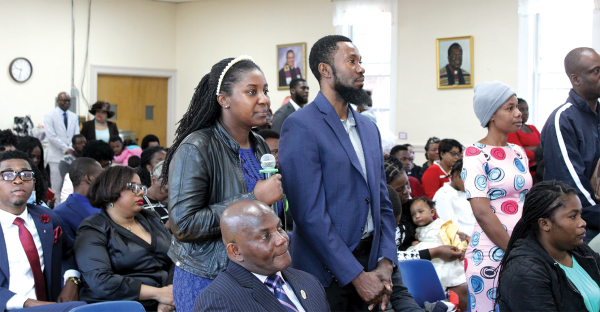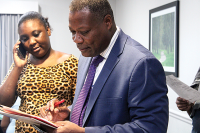May 16, 2024

New migrant arrivals from Haiti blend in with longtime worshippers at a recent weekend service held in Haitian Kreyol at Mattapan’s Parkway United Methodist Church. Vanessa Lee photo

On Sunday mornings, congregants at Total Health Christian Ministry meet for early worship in the fellowship hall of the Parkway United Methodist Church in Mattapan. They enter the hall, filling in the two columns of 120 red, blue, and green plastic chairs, each column six chairs wide and ten chairs deep. The service is meant to start at 8 a.m., but by 7:54, some are already on their feet, singing in Haitian Creole and swaying to the music.
As they sing, most of the worshippers read the lyrics from a paper bulletin or from a TV screen on the left side of the room. “Gloire, gloire à l’Eternel! Qu’un cantique solennel de nos cœurs monte à son trône.” In English: “Glory, glory to the eternal. Let a solemn song from our hearts rise to its throne.”
Whether they have been in the United States for decades or just a few months, every member of the church is a Haitian migrant.
The migrant crisis has strained Massachusetts resources and tested the resolve of many, but it is also drawing an already close Haitian American community in Boston even closer. Many of the new Haitian migrants have been sent by bus or plane to Massachusetts, where they have found their way to the church in Mattapan, a neighborhood that is home to the largest Haitian American community in the state. They come by word of mouth or through the advocacy of the church’s leader, Pastor Dieufort ‘Keke’ Fleurissaint.
Here they connect with people who speak their language and share familiar experiences. That bond was evident at the Parkway church on a recent Sunday. Throughout the service, worshippers took turns keeping babies and young children calm and quiet. A boy not yet old enough to crawl is handed off across the center aisle. A girl wearing a golden yellow dress walked away from her mother and ran across the front of the hall until she was scooped up by a congregant on the other side of the room.
The service is held in English and in Haitian Kreyol. Fleurissaint, who goes by the nickname Pastor Keke, stands on stage in front of a large white banner bearing the church’s name. The pastor, who immigrated from Haiti in 1981 and has his own special story of perseverance, is wearing his usual suit and tie, with a red pen clipped to his breast pocket. Microphone in hand, he steps forward when the signing pauses to deliver his sermon.
He preaches in English while another man translates in Haitian Kreyol about reaching salvation, staying healthy, and embracing the universality of grace. “Open your hearts to love to forgive others,” he says, ending his sermon as his listeners clap.
•••
Since 2022, Boston has seen the arrival of thousands of Haitian immigrants, leading to the current crisis. Many of the migrants walked through dangerous conditions in South and Central America and arrived along the Texas border – only to be moved on by state officials there to Massachusetts, which guarantees shelter to every individual. That law has ensured that anyone, particularly those eligible for emergency assistance, can find refuge in the Bay State, which has been a right-to-shelter state for the last 40 years, said Stephanie Rosario Rodriguez, senior director of programs at the Massachusetts Immigrant and Refugee Advocacy Coalition (MIRA), which was founded in 1987.
Beginning in 2021, after the United States hastily withdrew from Afghanistan and instability was rising in Central and South American countries, the state started seeing an increase in migrants, Rodriguez said, many of whom were Haitians who had originally migrated a decade ago from Haiti to countries such as Mexico and Chile following the catastrophic earthquake of January 2010.
“The largest population seen in shelters right now are Haitian migrants,” she said.
Dealing with the humanitarian crisis is part of Pastor Keke’s mission as founder of True Alliance Center, Inc., a Haitian American-led organization established to advocate for the Haitian community on issues like housing inequities. He helps migrants find temporary housing and, in some cases, jobs.
People learn about him through the network of families his nonprofit and church have assisted through the years. “As a pastor, as a leader, this is my duty to assist and support the immigrant community,” he said. It’s also part of his mission, he added. “You should see the joy that filled their faces, to be able to speak to someone who cared about them.”
Those who have worshiped with him said they are inspired by the outpouring of support they received from the pastor, his church, and the larger Haitian American community in the Boston area.
“This is a space with love,’’ said Jean Leon Beauboeuf, who has been attending the Mattapan church since he arrived in Boston from Haiti two years ago. “To be here is to please God, to share with our brothers and sisters in our relationship with God.”
Beauboeuf’s daughter, Anne Jolin, also finds a deep connection at the church and the larger community. While she doesn’t attend services every week, she said she knows there is a strong relationship between congregants.
“We know what other people’s struggles are, even if we don’t know each other or what we’re really living through,” said Jolin, who had left Haiti seven years ago and moved to France to work. She immigrated to the United States in March 2023.
Pastor Keke said he founded the True Alliance Center in 2010 to “collaborate with other immigration partner organizations to make sure that people have access to resources.” He was among the many local Haitian Americans who rallied to support people in Haiti following the deadly 7.0 magnitude earthquake in 2010. Many migrants sought refuge in Massachusetts and were granted temporary protective status (TPS) by the federal government. They still regularly worship with Pastor Keke.
Recently, widespread gang violence in Port-au-Prince has resulted in more migrants arriving in the United States. Many of those who have fled that scene also make their way to Keke’s Mattapan church.
“I was scared for my life, and I wanted to live,” said one female worshiper who fled Haiti four months ago. She spoke in Haitian Kreyol while a church member translated in English. “Living here feels better than living in Haiti,’’ the woman said.
Pastor Keke said these families are fleeing dangerous conditions in their homeland, such as political instability and natural disasters, and seeking things like housing, employment, education, and healthcare in Boston. These are young, energetic people who are eager to work,” he said. “They wouldn’t mind doing two to three jobs to provide for their immediate families here, as well as for their extended families living in Haiti.”
•••
Because many migrants are housed in hotels and shelters all over the state, Pastor Keke’s work often leads him outside the confines of his Mattapan church. On a recent weekday, he sat in a room full of migrant families at Hotel Best Western Plus in Franklin, Massachusetts, where individuals lined up to talk to him about their issues. Everyone in the room was comfortable with his presence, engaging in friendly conversations in Haitian Creole. Some approached him not just out of necessity, but to simply chat about their days.
A woman with two babies in a stroller wanted to talk to him about her children. A man asked the pastor how his day was going. “God bless you,” he said to them.
Pastor Keke and Enrique Keith Amara, an intern at the True Alliance Center, drive to Franklin every Tuesday. The hotel is a temporary residency for many Haitian migrants, whose issues vary from enrolling in English classes to downloading apps to file taxes to applying for work authorization and, ultimately, to finding employment.
The pastor stresses three key priorities for these migrants — learning English, securing housing, and gaining work authorization to get a job. “We’re trying to help them integrate into the US system,” he said. “If we know that their job is stable, we can connect them with housing opportunities, and so on.”
Amara, the intern, was born in Boston to Haitian parents who had received help from Pastor Keke in the past. He helped them file taxes when they arrived in the country, and eventually, it became Amara’s turn to support the pastor. “My aunt connected me to Pastor Keke, saying he needed help with his work,” he said.
Amara, a computer science student at Wentworth Institute of Technology, is using what he’s learning in college to help Haitian migrants improve their technological and computer skills. “I want to give back to my community,” he says.
“Sometimes, they approach me with a cracked phone screen, to ask me to help fix it,” Amara said, chuckling. “Unfortunately, I can’t help with that. But I can help them with other things, like enrolling them into English classes and applying for work authorization.”
While Pastor Keke he goes to the hotel in Franklin every Tuesday, on Thursdays his day involves travelling to the Hampton Inn & Suites in Stoughton, where the notice on the door reads “Closed until further notice.” The hotel shut down its business operations in December to become a shelter after it became clear that most of the guests were Haitian migrants who needed help adjusting to American life, Pastor Keke said.
People come and go, and he sits in a booth, welcoming them with their questions about health insurance assistance and housing. One woman urged him to help her after she shared her ordeal in seeking health insurance for a year and not getting anywhere, despite filling out the proper paperwork.
As the day unfolds inside the Stoughton hotel, the children’s show ‘Paw Patrol’ plays on a flat-screen TV hanging on the wall beside the main entrance. A commercial for Barbie dolls interrupts the episode.
As a group of girls walk through the hotel’s sliding glass doors into the lobby, Pastor Keke calls out to them, inviting them to a workshop series hosted by Young Queens Rising that was designed for girls ages 14 to 18 to talk about self-discovery, self-love, and preserving culture.
Most of the other organizations that help migrants host legal clinics for people applying for asylum. But they don’t often help them fill out paperwork or help with technical details, which is why the shelters are important, Pastor Keke said. “If migrants also face trauma, we can help them cope,” he said. “That’s not something clinics do.”
•••
On Sunday mornings, the migrants and the pastor put their worries, and their paperwork, aside. It is then that the community comes together. At the fellowship hall in Mattapan, the congregants are back on their feet, singing one final hymn before the service ends at 9:30.
“Nanpwen lòt Sali pou lèzòm Jodi a,” they sing. “Vin chache sekou li anvan li twò ta.” In English: “Another salvation for man today. Come to her rescue before it’s too late.”
Then, without instruction, the worshippers stack the plastic chairs, organized by color, and push them to the perimeters of the hall. They say they're good-byes and leave for home, some by foot to housing nearby, others waiting for an Uber to drive them back to one of the area hotels serving as a Haitian migrant shelter.
Abby Van Selous and Vanessa Lee are students at Boston University and study journalism under the guidance of Meghan Irons, a former Boston Globe reporter. Lee has worked as an intern at the Reporter this semester.


